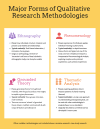A novice's guide to qualitative health professions education research
- PMID: 35978555
- PMCID: PMC10091973
- DOI: 10.1111/ced.15381
A novice's guide to qualitative health professions education research
Abstract
Qualitative research has long been considered the poor cousin to quantitative research. However, recently it has gained more prominence and respect, particularly within health professions education. This article aims to introduce the novice researcher to the fundamental principles of qualitative research. The objectives were (i) to understand the features of, and rationale for conducting, qualitative research, and (ii) to differentiate between the most common forms of qualitative research. In this review, we introduce the basic features of qualitative research, and describe the rationale for conducting such research. We guide researchers on how to differentiate between the most common forms of qualitative research and to take the time to acquaint themselves with research paradigms, the philosophical positions that guide how research is conducted and interpreted, before selecting the best methodology and methods. Qualitative research is rigorous, and offers deeper understanding of human experiences, context and social phenomena. We demonstrate the key considerations when selecting an appropriate methodology, ensuring that the research aim aligns with the purpose of any given methodology. The power of qualitative research should not be underestimated, but power only comes from well conducted, rigorous research. Qualitative research is not quick or easy but it has much to offer.
© 2022 The Authors. Clinical and Experimental Dermatology published by John Wiley & Sons Ltd on behalf of British Association of Dermatologists.
Conflict of interest statement
The authors declare that they have no conflict of interest.
Figures



References
-
- Bunniss S, Kelly DR. Research paradigms in medical education research. Med Educ 2010; 44: 358–66. - PubMed
-
- Varpio L, Ajjawi R, Monrouxe LV et al. Shedding the cobra effect: problematising thematic emergence, triangulation, saturation and member checking. Med Educ 2017; 51: 40–50. - PubMed
-
- Greenhalgh T, Annandale E, Ashcroft R et al. An open letter to The BMJ editors on qualitative research. BMJ 2016; 352: i563. - PubMed

